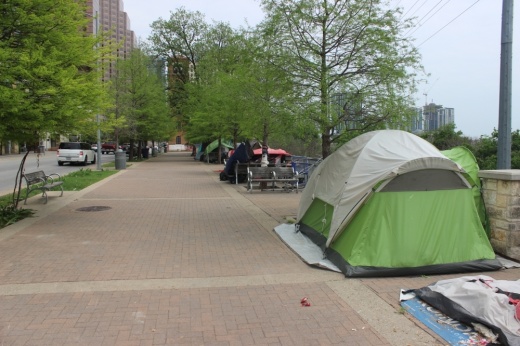Days into the third stage of its camping ban implementation, the city of Austin shared some additional details on where its homeless outreach and enforcement efforts now stand.
In a statement, the city said Austin Police Department officers carried out some initial Proposition B Phase 3 education work downtown on the Ann and Roy Butler Hike and Bike Trail on July 13. Those actions resulted in 21 written warnings to campers in that area, the city said.
Through the first two phases of outreach and warnings, police have connected with more than 530 people experiencing homelessness located in dozens of locations citywide. Of those, 122 have been connected with social services along with 34 veterans who were connected with Veterans Affairs services.
Phase 1 saw 390 verbal warnings issued to public campers, and 210 written warnings were issued during Phase 2, the city said.
In addition to the enforcement update, the city also shared information on its available shelter options for people experiencing homelessness July 14.
City bridge shelter capacity is gradually expanding with the recent opening of South Austin’s Southbridge facility and the expected conversion of a former COVID-19 Protection Lodge into a similar facility this August at 3105 I-35, Austin. Those two facilities will provide around 130 additional shelter beds, and the city said more room may become available at congregate shelters if pandemic-era capacity limits are lifted.
Officials including Homeless Strategy Officer Dianna Grey said the city remains focused on outreach and expanding resources amid its homelessness crisis. However, she also noted that “there will not be enough immediate shelter for all unsheltered Austinites” this year as Proposition B enforcement continues, a sentiment shared by interim Police Chief Joseph Chacon.
“Coordination during this effort has been productive through progressive enforcement, outreach and education,” Chacon said in a statement. “While officers may write citations for violations, we are hopeful for no punitive penalties and to connect individuals to services and resources through diversion efforts in partnership with Downtown Austin Community Court. Enforcing this ordinance is a challenge. Like many communities battling homelessness, there simply aren’t enough places for people experiencing homelessness to go.”
Posted July 12 12:57 p.m.
The rollout of Austin's reinstated public camping ban moved into its third phase July 11, kicking off a one-month period that will generally see continued written warnings and citations issued to violators to be potentially accompanied by some arrests.
Though Aug. 7, Austin Police Department officers will still meet with anyone living on the streets who they have not yet contacted since Proposition B's May passage for "education and outreach" about the new camping law. If a written warning for camping has already been given to an individual, then APD officers will move to issue a citation if the person has not relocated.
Another component of the third enforcement phase is a focus on arresting campers living anywhere "deemed dangerous for the public" who have refused to move. According to the city, such areas include spaces near major roadways or in spaces at risk of flooding or fire. Beginning Aug. 8, the fourth and final enforcement phase will see arrests for anyone who does not relocate after they are cited.
A planned briefing by Austin officials on Phase 3 of Proposition B's implementation scheduled for July 12 was canceled, although more information on the current stage may be released by the city over the coming days. In an update on the first two Proposition B phases given to the Austin Public Safety Commission July 6, APD Lt. Lawrence Davis spoke on the department's focus on education and connecting people experiencing homelessness with social and housing services.
Davis said that, while dozens of individuals have received some support through the outreach side of the city's phased plan, a chief concern remaining among the homeless and officers conducting enforcement work is the need for a direct shelter or housing solution.
"The elephant in the room is, hey, where do we tell folks to go? And so if we’re going to ask them to leave, we ought to have a place to take them," Davis said July 6.
City officials and staff have also been considering that question since Proposition B first passed, although a comprehensive solution has not yet been solidified. Staff in a July 1 memo said the evaluation of expanded shelter capacity and the establishment of two sanctioned encampments on city-owned land could be among the next steps in providing for the hundreds or thousands of homeless individuals who may be forced to relocate over the weeks and months ahead. A new report on those plans is expected from staff July 22.





